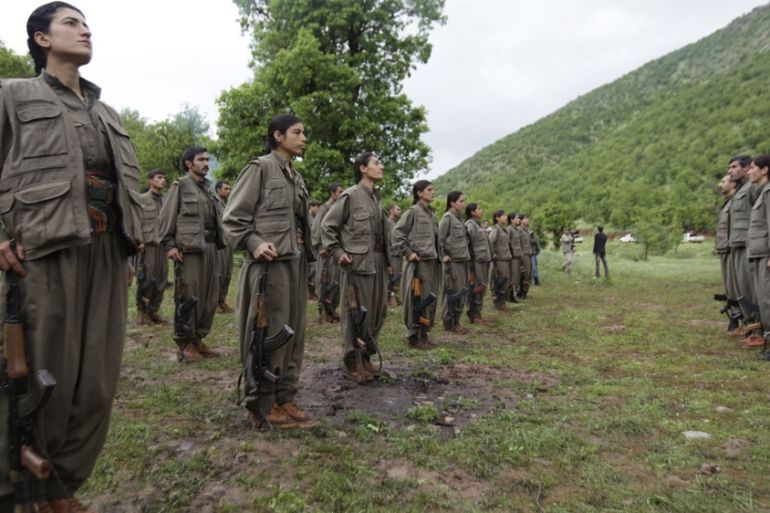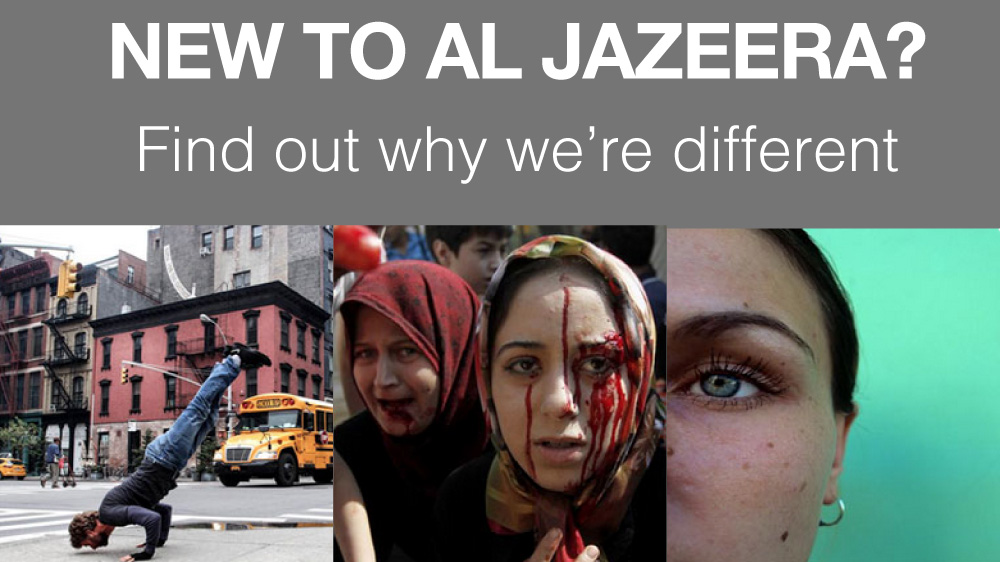What is next for Turkey’s Kurdish peace process?
Turkey and the PKK have no option but to work towards a political resolution.

With the recent outbreak of the violence and fighting between Turkey and the outlawed Kurdistan Workers’ Party (PKK), Turkey’s famed Kurdish peace process has entered uncharted waters.
PKK began their fight for independence in the late 1970s and have been struggling for greater autonomy and recognition of Kurdish rights within Turkey ever since.
Keep reading
list of 4 itemsTurkey hits 71 targets in Iraq, Syria in retaliation for soldiers’ deaths
Turkey says bombers came from Syria, threatens more cross-border strikes
‘Iraqis love life’: In conversation with Ala Talabani
In 2013, the Turkish government and the PKK’s jailed leader, Abdullah Ocalan, struck a ceasefire deal to find a resolution to the decades-old Kurdish issue.
In northern Iraq’s Qandil Mountains, the PKK declared that the ceasefire has lost its meaning given Turkey’s recent aerial bombardments.
RELATED: What now for the Kurdish peace process?
Likewise, Turkish President Recep Tayyip Erdogan said that it is impossible to continue with the process amid the PKK’s attacks.
To be precise, the process was already largely frozen even before this recent fighting.
Syrian imbroglio, developments in Turkey’s domestic politics such as Gezi Park protests and power struggles between the government and the Gulen Movement, and three elections in a row in Turkey last year have all made the peace process take a back seat to other issues and concerns.
Nevertheless, it is the immediate ripples of the Syrian crisis that has pushed the process to the brink of collapse.
Different visions of resolution
Moreover, the different visions of the process and of the possible resolutions to be adopted by the parties -and PKK’s confusion about its role in the post-conflict period – have proved to be formidable challenges for the process going forward.
The latest developments in the Kurdish peace process are symptoms of a larger problem, not the cause.
Though these developments frustrate the process, it is unlikely to completely derail it.
|
|
| Has Turkey bitten off more than it can chew? |
The costs of the termination of the peace process, and the resulting return to the old days of bloody conflict, is prohibitively high for both parties to be willing to incur.
Neither Turkey, nor the PKK, can attain anything other than pyrrhic victory by reinstating a long-lasting, exhausting war – especially at a moment when Turkish and Kurdish society have had a taste of normalcy and non-violence.
We are witnessing a transitional period of arm-twisting until the dust has settled on the domestic political front.
In the meantime, some sort of modus vivendi between Turkey and the Syrian Kurds needs to be achieved, hence paving the way for both parties to regain their senses.
Since the beginning of the process, the Turkish and Kurdish sides’ understanding of the Kurdish issue and its prospective resolution have remained largely different.
What is the resolution?
For the Kurds, the conflict is no longer an issue of solely striving for democracy on an individual level as it has been portrayed.
Instead, the Kurds see the Kurdish issue as a national question with all its attendant rights and privileges; and while their movement falls short of secessionism, achieving their goal requires significant levels of power devolution and the rearrangement of public administration to reflect a new and multicultural Turkish political identity.
Unless both sides can reconcile their differing views on the inherent nature of the Kurdish issue in Turkey, the peace process cannot reach its stated goal: achieving a political settlement which is amenable to both sides.
In contrast, the government has been aiming to keep the Kurdish issue as much as a function of Turkey’s democratic deficit, hence curable with nationwide democratisation steps aimed at the identity groups, as possible.
Such an understanding expectedly falls short of meeting Kurdish demands.
Emboldened by the domestic atmosphere, and by the benchmarks set by the Kurdistan Regional Government in Iraq and a fledgling Kurdish autonomous region in Syria, Turkey’s Kurds expect a significant level of power devolution from centre to the periphery and change within the political system – these concessions would be considered integral to any meaningful settlement of the issue.
Unless both sides can reconcile their differing views on the inherent nature of the Kurdish issue in Turkey, the peace process cannot reach its stated goal: achieving a political settlement which is amenable to both sides.
Moreover, since the commencement of the Arab Spring, the PKK has heavily invested political capital in the Kurdish part of Syria – popularly known by its Kurdish name, Rojava.
Developments in Syria function as a make or break point for Turkey’s Kurdish peace process. This point was conspicuously confirmed when the Kurdish political movement initiated waves of protests, in October 2014, over the Islamic State of Iraq and the Levant’s (ISIL) siege of the northern Syrian Kurdish town of Kobane.
Absence of regional Kurdish policy
The nationwide protests resulted in the deaths of more than 50 people and brought the whole peace process to its knees.
Likewise, the latest developments in the Kurdish region of Syria have gravely endangered the success of the peace process – particularly the fighting between the PKK and ISIL, which can no longer be solely confined to Syria and has instead spilled over into Turkey with deadly consequences.
The recent suspected ISIL suicide bombing in Suruc is a prime example of this.
The bottom line is that a common Kurdish consciousness has evolved as a result of the Kurdish fight against ISIL – uniting groups of Kurds at the societal level once seemingly scattered across the Middle East.
Turkey’s foreign policy seems to be ill-equipped to face this new trend.
RELATED: The contest between two quasi-states: ISIL and Rojava
Instead of crafting a foreign policy that can address this new reality, Turkey has kept to its fragmented Kurdish policy – a policy which means separate rules and strategies regarding the Kurdistan Democratic Party (KDP), PKK, Patriotic Union of Kurdistan (PUK), and the Democratic Union Party (PYD).
Turkey has no “macro” Kurdish policy to address Kurds across the region.
This approach is set to face many challenges. The emergence of a common Kurdish consciousness means that developments in one part of Kurdistan will have serious ramifications on the others.
In this regard, unless Turkey adopts a clear regional Kurdish policy, especially the one towards the Syrian Kurds, the peace process is unlikely to advance in any significant way.
No conflict resolution process can succeed without both parties having clear visions for themselves and their roles in the post-conflict period.
Revitalising peace process
The PKK does not seem to have a clear idea as to what will become of it once the armed struggle phase of the Kurdish conflict in Turkey is over.
In spite of all of these complications, there are sufficient structural reasons why the peace process can be revitalised – especially if those reasons are coupled with political flexibility and strong leadership.
During a peace process, the ability to define the problematic areas and issues that prove inimical to the process are crucial for the successful continuation of the process down the road – and Turkey and the Kurds are finally in a position to do that. Identifying the major issues preventing peace will directly aid in the reconciliation process.

Recently, Jonathan Powel, Britain’s chief negotiator of the Northern Ireland peace deal, forcefully stressed this point. He rightly said that after each failure, the negotiating parties learn something about the nature of their divisions and can use those lessons in their new trials in moving forward in the peace processes.
Keeping this in mind, Turkey’s Kurdish peace process is no doubt experiencing hard times. Once again, mangled bodies of young Turks and Kurds are dominating the headlines.
Despite this, Turkey and the PKK have no option but to work towards a political resolution and neither party can afford the continuation of the struggle.
In this respect, even the ones who have initiated the peace process can no longer conclusively end it. The Kurdish peace process is experiencing setbacks, but not facing the prospect of complete termination.
Galip Dalay is senior associate fellow on Turkey and Kurdish Affairs at Al Jazeera Center for Studies, research director at Al Sharq Forum.
The views expressed in this article are the author’s own and do not necessarily reflect Al Jazeera’s editorial policy.
